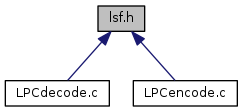This graph shows which files directly or indirectly include this file:

Go to the source code of this file.
Functions | |
| void | a2lsf (float *freq, float *a) |
| void | lsf2a (float *a_coef, float *freq) |
Function Documentation
◆ a2lsf()
| void a2lsf | ( | float * | freq, |
| float * | a | ||
| ) |
Definition at line 27 of file lsf.c.
References cos, FLOAT_MAX, LPC_FILTERORDER, LPC_HALFORDER, LSF_NUMBER_OF_STEPS, and TWO_PI.
Referenced by SimpleAnalysis().
◆ lsf2a()
| void lsf2a | ( | float * | a_coef, |
| float * | freq | ||
| ) |
Definition at line 170 of file lsf.c.
References a, b, cos, lpc10_decoder_state::j, LPC_FILTERORDER, LPC_HALFORDER, PI2, and TWO_PI.
Referenced by LSFinterpolate2a_dec(), and LSFinterpolate2a_enc().
 1.8.13
1.8.13